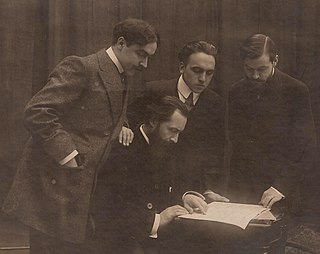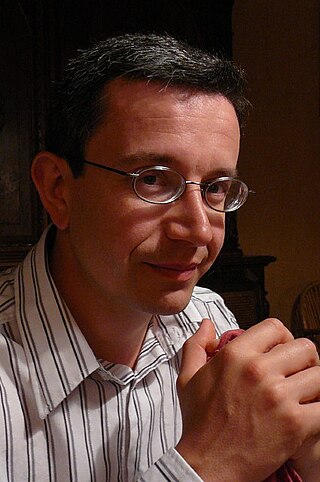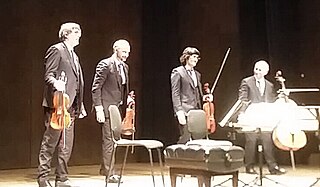
In music, a quartet is an ensemble of four singers or instrumental performers.

Michael Laurence Nyman, CBE is an English composer, pianist, librettist, musicologist, and filmmaker. He is known for numerous film scores, and his multi-platinum soundtrack album to Jane Campion's The Piano. He has written a number of operas, including The Man Who Mistook His Wife for a Hat; Letters, Riddles and Writs; Noises, Sounds & Sweet Airs; Facing Goya; Man and Boy: Dada; Love Counts; and Sparkie: Cage and Beyond. He has written six concerti, five string quartets, and many other chamber works, many for his Michael Nyman Band. He is also a performing pianist. Nyman prefers to write opera over other forms of music.

Henri François Joseph Vieuxtemps was a Belgian composer and violinist. He occupies an important place in the history of the violin as a prominent exponent of the Franco-Belgian violin school during the mid-19th century. He is also known for playing what is now known as the Vieuxtemps Guarneri del Gesù, a violin of superior workmanship.

Alexander Tansman was a Polish composer, pianist and conductor who became a naturalized French citizen in 1938. One of the earliest representatives of neoclassicism, associated with École de Paris, Tansman was a globally recognized and celebrated composer.

Grażyna Bacewicz Biernacka was a Polish composer and violinist of Lithuanian origin. She is the second Polish female composer to have achieved national and international recognition, the first being Maria Szymanowska in the early 19th century.

André George(s) Louis Onslow was a French composer of English descent. His wealth, position and personal tastes allowed him to pursue a path unfamiliar to most of his French contemporaries, more similar to that of his contemporary German romantic composers; his music also had a strong following in Germany and in England. His principal output was chamber music, but he also wrote four symphonies and four operas. Onslow was esteemed by critics of his time, but his reputation declined swiftly after his death. It has only been revived in recent years.

Robert Marcel Casadesus was a renowned 20th-century French pianist and composer. He was the most prominent member of a distinguished musical family, being the nephew of Henri Casadesus and Marius Casadesus, husband of Gaby Casadesus, and father of Jean Casadesus.

Paul Alexandre Camille Chevillard was a French composer and conductor.
The Kolisch Quartet was a string quartet musical ensemble founded in Vienna, originally as the New Vienna String Quartet for the performance of Schoenberg's works, and settling to the form in which it was later known. It had a worldwide reputation and made several recordings. The quartet disbanded in the United States during the early 1940s.

The Capet String Quartet was a French musical ensemble founded in 1893, which remained in existence until 1928 or later. It made a number of recordings and was considered one of the leading string quartets of its time.

Georges Elbert Migot was a prolific French composer. Though primarily known as a composer, he was also a poet, often integrating his poetry into his compositions, and an accomplished painter. He won the 1921 Prix Blumenthal.
The Krettly Quartet was a French string quartet musical ensemble active during the 1920s and 1930s. Its repertoire included avant-garde and modern works, and the group made early recordings of some of these.
Alan Shulman was an American composer and cellist. He wrote a considerable amount of symphonic music, chamber music, and jazz music. Trumpeter Eddie Bailey said, "Alan had the greatest ear of any musician I ever came across. He had better than perfect pitch. I've simply never met anyone like him." Some of his more well known works include his 1940 Neo-Classical Theme and Variations for Viola and Piano and his A Laurentian Overture, which was premiered by the New York Philharmonic in 1952 under the baton of Guido Cantelli. Also of note is his 1948 Concerto for Cello and Orchestra which was also premiered by the New York Philharmonic with cellist Leonard Rose and conductor Dmitri Mitropoulos. Many of Shulman's works have been recorded, and the violinist Jascha Heifetz and jazz clarinetist Artie Shaw have been particular exponents of his work both in performance and on recordings.
The Loewenguth Quartet was a string quartet music ensemble led by the French violinist Alfred Loewenguth. It was particularly famous for performances of classical repertoire such as Beethoven, Mozart and Haydn quartets, and was active from the 1930s to the 1970s.
Serge Collot was a French violist and music educator.

Jules Delsart was a French cellist and teacher. He is best known for his arrangement for cello and piano of César Franck's Violin Sonata in A major. Musicologist Lynda MacGregor described Delsart as "one of the foremost French cellists of the period, with faultless technique, a precise bow and a sweet, though not large, tone." He was the owner of the 1689 'Archinto' Stradivari.

Thierry Joseph-Louis Escaich is a French organist and composer.
Claude Debussy's Six sonatas for various instruments was a projected cycle of sonatas that was interrupted by the composer's death in 1918, after he had composed only half of the projected sonatas. He left behind his sonatas for cello and piano (1915), flute, viola and harp (1915), and violin and piano (1916–1917).

Baudime Jam is a French violist, composer and musicologist.

The Danel Quartet is a French/Belgian string quartet established in June 1991. Known for classical, early modern and contemporary repertoire, they tour internationally and have an extensive discography. They have both recorded and performed the first complete cycle of string quartets by Mieczysław Weinberg and have undertaken a complete cycle of the quartets of Dmitri Shostakovich as well.













